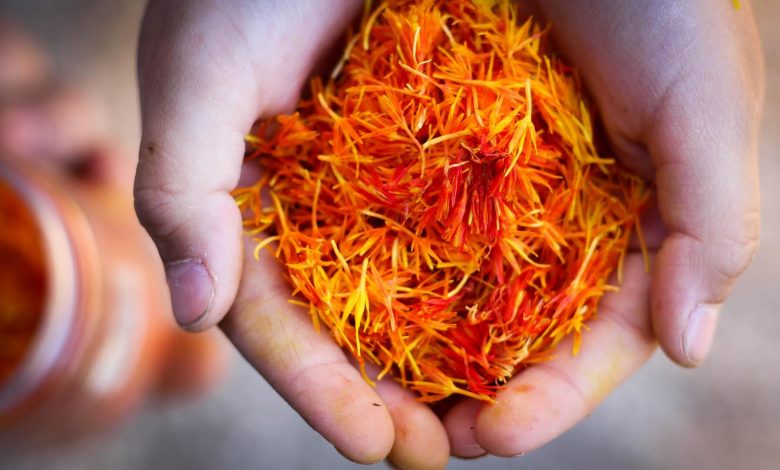What are the Benefits of Saffron for the Skin?

The multiple properties that the saffron plant offers also contribute to providing a number of benefits that help us support and maintain skin health:
1. Protection from Sun Damage: Saffron helps protect against UV damage that the skin receives during exposure to sunlight. These rays increase the production of free radicals in the body and skin, which means damage and fatigue of skin cells. Thanks to its abundant antioxidants, saffron, especially a compound called crocin, greatly helps to fight free radicals and protect against ultraviolet rays, which are very helpful in protecting the skin from fatigue and exposure to various diseases and problems.
2. Fight against signs of aging: Antioxidants are one of the most beneficial substances in combating the appearance of wrinkles and signs of premature aging, and thanks to the richness of saffron in these substances, they are very useful in reducing the appearance and signs of wrinkles.
3. Fight Infections: The skin is affected by a number of different infections, some bacterial, some allergic and others. Saffron is an important plant in skin care with its many properties containing a group of vitamins, minerals and rich in antioxidants. It fights skin infections while working to treat the skin and get rid of them.
4. Aiding wound healing: It has been found that saffron supports cell proliferation in the skin and tries to renew them, as well as its antioxidant and anti-inflammatory properties that help support this reproductive process, as well as help speed up the healing process. It reduces the scars and the scars left by these wounds.
5. Reducing the symptoms of melasma: Many women face problems with skin pigmentation and the appearance of melasma due to repeated exposure to sunlight or hormonal changes or other reasons. Melanin secretion in the skin decreases, which helps to reduce melasma and pigmentation spots on the skin.
What are the Benefits of Saffron for Hair?
We can also see that the many benefits of saffron have beneficial effects on hair health, including:
1. Reduce hair loss: In addition to its richness in various vitamins such as vitamin A, vitamin C, folic acid, vitamin B3, and others, the antioxidant properties of saffron help prevent hair loss and increase its strength.
2. Purifying the scalp: Saffron helps treat some scalp problems as it is an effective anti-inflammatory and rich in antioxidants. It provides purification of the scalp and regeneration of follicles.
3. Promote hair growth: The multiple nutrients present in saffron, including vitamins and minerals, in addition to its effective properties in reducing hair loss and reducing scalp infections, all help support hair health and contribute to strengthening it and promoting its growth.
4. Worn hair treatment: Saffron, while preparing the mixture with a group of beneficial oils suitable for all types of hair, contributes to the alleviation of the problems of damaged hair and helps it to gain a more lively appearance.
What Are the Possible Side Effects of Saffron?
In general, saffron is safe when eaten in modest small amounts. However, in a few cases, some of the following symptoms may be observed:
• Feeling anxious and restless
• Bad mood and fluctuations
• dry mouth
• Excessive sweating
• Headache
• Pay attention to the redness of the face
• Feeling sleepy
• feeling sick or vomiting
• Digestive problems such as constipation or diarrhea
• Some allergic reactions
What Are the Precautions for Using Saffron?
Saffron is an herb with multiple and powerful effects on the body. Therefore, before you decide to consume, you should pay attention to a number of things:
1. Pregnancy and lactation period: We mentioned that saffron has many benefits for pregnant women, but it carries some risks, the most dangerous of which is miscarriage at an early age and eating large amounts of food uncontrolled when using saffron carelessly. During this period, breastfeeding women are recommended to stay away from saffron.
2. Heart disease: Saffron is believed to increase the speed and strength of the heartbeat, so excessive consumption may not be completely safe for people with certain heart diseases.
3. Diabetes: Saffron has effects on blood sugar, so it is recommended to monitor the sugar level periodically and regularly for those with diabetes and those who use saffron.
4. Low blood pressure: Saffron has an antihypertensive effect, so it is not recommended for people who suffer from frequent cases of low blood pressure to use saffron.
5. Surgical operations: If an appointment is made for the operation after a while, the use of saffron should be discontinued and you should stop at least two weeks before the operation. This is because bile slows down the work of the central nervous system and the patient is given narcotic drugs before the surgery or is exposed to anesthesia during the surgery.





